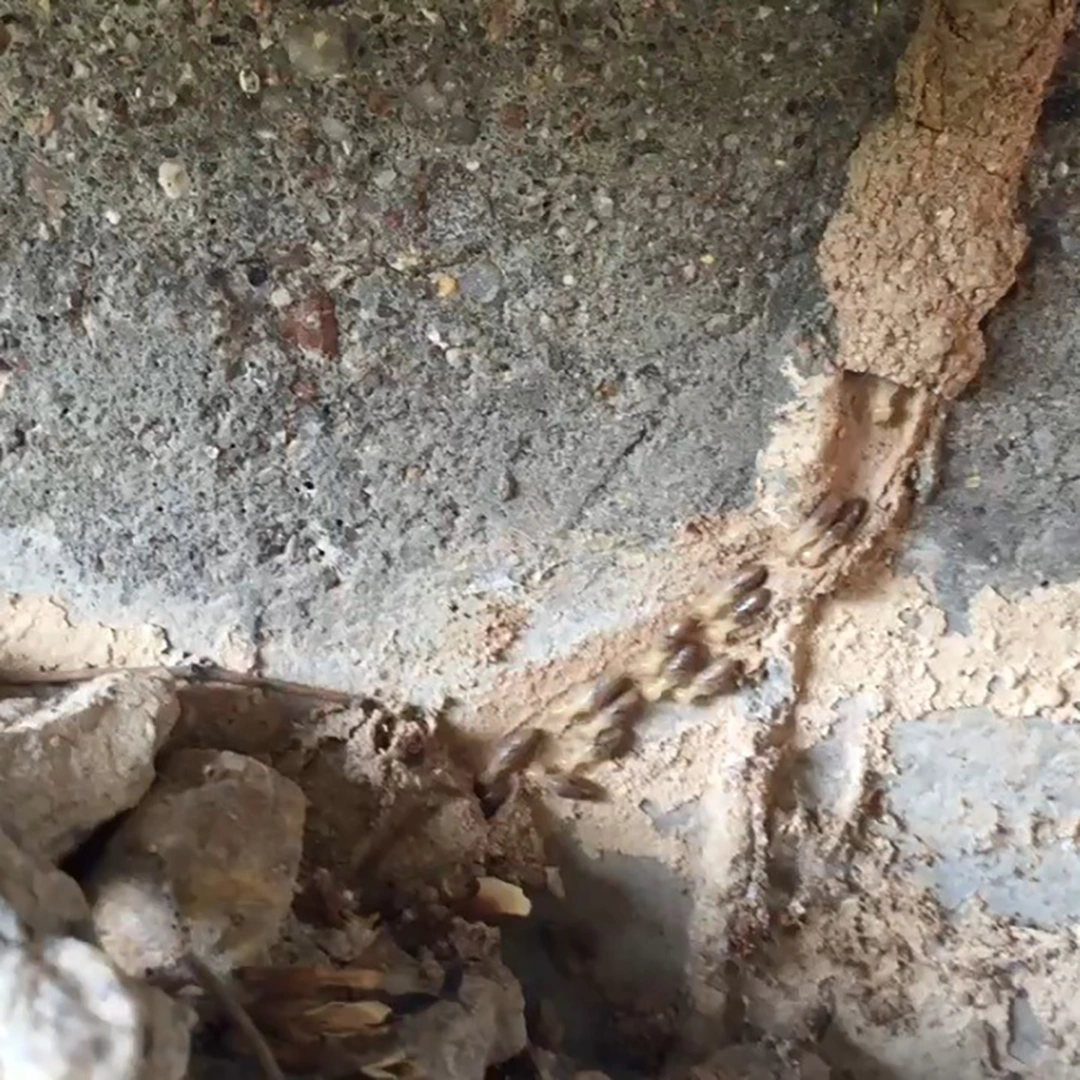Termite Control Questions
Find answers to your questions about termite control in East Valley AZ
Frequently Asked Questions About Termite Control
If you’ve found damaged wood, mud tubes, or unexplained cracks around your home, you probably have questions—and concerns—about termites. We hear from Arizona homeowners daily looking for fast, clear answers to their most common Termite Control Questions. Whether you’re wondering how inspections work, how to prevent future infestations, or what treatments actually get the job done, you’ll find trusted, local answers right here.
Termite Inspection & Treatment
How much does a termite inspection cost?
At All Clear Pest Control, we offer detailed termite inspections customized to your home's size and location. While many inspections are free of charge, particularly if bundled with a service or ongoing termite protection plan, specialized inspections typically range from $50 to $150 in the East Valley area. At All Clear Pest Control, we guarantee competitive and affordable prices. Contact our friendly staff for a fast, obligation-free estimate of termite inspection and treatment.
Should I get a termite inspection even if I don’t see any signs of termites?
Yes. In Arizona, termites are often active without showing visible signs, especially in newer homes. We recommend annual inspections even if your home is new or recently treated. Early detection is key to avoiding expensive structural damage. New homeowners should also consider proactive treatments.
What happens during a professional termite inspection?
During a termite inspection a termite-control licensed technician thoroughly examines your home for signs of termite activity. This includes inspecting:
- Foundation areas, attics, crawl spaces, and garages.
- Interior and exterior woodwork for damage.
- Visible signs like mud tubes, wings from swarmers, or termite droppings (frass).
We document findings and recommend treatment or prevention strategies as needed. Learn more about our termite inspection process.
How should I prepare my home for a termite inspection?
Clear items away from garage walls, baseboards, and under sinks so the technician can inspect wood-to-ground contact points and plumbing entry areas. If attic access is needed, make sure the hatch is accessible. Preparation helps ensure a more thorough evaluation.
How long does a termite inspection usually take?
Most inspections take between 45 minutes to 1.5 hours, depending on the size of the home or building and whether crawlspaces or attics need to be accessed.
How much does termite treatment typically cost?
Termite treatment costs in the East Valley typically start from $400 and range depending on the home's size, infestation severity, and treatment method used. At All Clear Pest Control, we offer competitive and transparent pricing. To get an exact quote tailored to your home, please reach out directly to our friendly team.
How often should I schedule termite treatments?
After an initial termite treatment, we recommend annual inspections to ensure continued protection. In Arizona, regular monitoring is crucial since our warm climate creates an ideal environment for termites year-round. Our team at All Clear Pest Control can recommend a customized schedule based on your property's unique conditions.
How long does termite treatment typically last?
Termite treatments usually last around five years, though this varies by treatment method and the home's conditions. Liquid soil treatments commonly used in the East Valley provide long-term protection, while bait systems require periodic monitoring. Regular inspections ensure the treatment remains effective over time.
What methods do exterminators use to eliminate termites?
At All Clear Pest Control, we use two primary termite treatment methods in Arizona:
- Liquid Barrier Treatments: These create a protective barrier around your home, preventing termites from entering.
- Termite Baiting Systems: Bait stations placed around the property eliminate termite colonies by targeting them directly.
We’ll carefully evaluate your home's specific situation to determine the best approach.
Can I treat termites myself?
DIY termite products typically do not reach deep enough into the soil or wall voids to eliminate the colony. Professional treatment ensures full eradication and long-term prevention. Our expert termite control services are backed by years of experience in Arizona homes.
What is a termite protection plan?
A termite protection plan includes regular inspections, proactive monitoring, and preventive treatments designed to keep your East Valley home termite-free.

Spotted Signs of Termites? Book an Inspection Today!
Termites in the East Valley
What types of termites are most common in the Phoenix metro area?
The most common termite species in Arizona, and specifically in the East Valley, are subterranean termites. These termites build colonies underground and enter homes through mud tubes they construct to reach wooden structures. Drywood termites also occasionally appear, particularly in older homes in Mesa, Gilbert, and Apache Junction, and live directly in the wood.
What do subterranean termites look like?
They are small, pale-colored insects with soft bodies and straight antennae. Unlike ants, their bodies have no defined waist. Swarmers (reproductive termites) have wings and are often mistaken for flying ants.
What are common signs of a termite infestation?
Signs of termite infestation in East Valley homes include:
- Mud tubes along foundations, walls, or ceilings.
- Hollow-sounding wood or structural damage.
- Termite swarmers (winged termites) appearing indoors or around your home.
- Termite droppings (frass) resembling tiny wood pellets.
- Discarded wings near windows or entry points.
We will explain how to spot these issues during a termite inspection.
What does termite damage look like?
Termite damage often appears as warped, blistered, or hollow-sounding wood. In advanced infestations, walls may show cracks, peeling paint, or bubbling surfaces. Termites can compromise structural integrity, causing serious damage to your home if untreated.
What does termite frass (poop) look like?
Frass resembles small wood-colored pellets or sawdust and may appear in piles near baseboards or in corners.
How do termites enter your house?
Termites enter homes through:
- Tiny cracks and gaps in foundations or walls.
- Wood-to-ground contact around your home's foundation.
- Expansion joints or openings around plumbing and utility lines.
- Moist areas that attract termites, such as leaking pipes or damp landscaping.
Regularly inspecting and sealing entry points is critical for termite prevention in Arizona’s East Valley.
How fast can termites spread and cause damage?
A large colony can consume up to a foot of a 2x4 every few months. Termite activity is 24/7—without intervention, serious damage can occur in less than a year.
If my neighbor has termites, am I likely to get them too?
While a neighbor’s termite infestation doesn't guarantee you'll have one, it does significantly increase your risk. Termites in Arizona spread underground, easily traveling between neighboring homes, especially in densely built areas like Gilbert, Chandler, or Queen Creek. Regular inspections and preventive treatments are strongly advised.
Can termites infest my attic or ceiling?
Yes, termites can infest attics or ceilings, especially if moisture or exposed wood is present. Drywood termites are more common in attics, while subterranean termites might extend their mud tubes upward into ceilings if moisture conditions allow.
How can I check for termites on my own?
Look for mud tubes along the foundation, tap wood to check for hollowness, and monitor window sills for wings. Still, professional inspections are more reliable. Learn more about residential and commercial pest protection.
What attracts termites to a house?
Moisture, wood-to-soil contact, untreated lumber, and mulch near the foundation all create ideal conditions for termites.
How can I detect termites early before serious damage occurs?
Early termite detection involves regular inspections, especially checking:
- Foundations and exterior walls for mud tubes.
- Wood in attics, garages, and crawl spaces for damage.
- Signs of termite swarmers or discarded wings in early spring and late summer.
Routine professional inspections from All Clear Pest Control provide reliable early detection.
How can I prevent termites from infesting my home?
Effective termite prevention includes:
- Regular inspections from All Clear Pest Control.
- Eliminating wood-to-soil contact around foundations.
- Managing moisture by fixing leaks and improving drainage.
- Sealing cracks or openings around your home’s exterior.
- Using preventive termite treatments designed specifically for Arizona conditions.
By following these guidelines and partnering with our professionals, you’ll greatly reduce your risk of termites.
What’s the difference between termite prevention and treatment?
Prevention includes regular inspections, moisture control, and soil treatments before any activity is found. Treatment addresses an active infestation using chemical or baiting solutions.
Termites in the Phoenix Metro
Termites are silent destroyers—but with the right information and quick action, they don’t have to damage your home. Whether you’re ready to book a professional termite inspection or want to learn more about our long-lasting termite treatment solutions, All Clear Pest Control is here to help. Our trusted termite control services are designed specifically for Arizona homes, using proven methods to stop infestations and prevent new ones from taking hold. Have more questions? Reach out today and let us protect what matters most.
